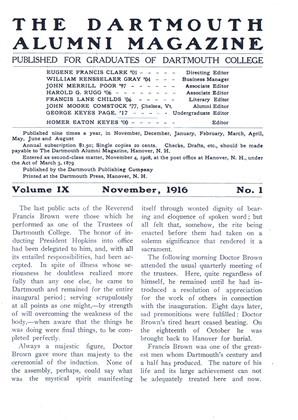EVANS, LAWRENCE 8., Samuel W. McCall, Governor of Massachusetts. Boston: Houghton Mifflin Company, 1916. Pp. 242.
At the somewhat tender age of two years and in the year 1853, Samuel W. McCall heeded the advice of Horace Greeley to "Go West," and lived for some years in Illinois. Mr. Greeley's famous exhortation, however, did not involve continued residence in the land of promise and Mr. McCall, therefore, felt privileged to reverse the usual order of things and spend the remainder of his life in New England. Possibly it would be difficult to duplicate the experience of a man who was born in Pennsylvania, spent his early youth in Illinois, was educated in New Hampshire and spent his mature life in Massachusetts. Such, however, was the career of Mr. McCall. Not much emphasis is placed in Mr. Evans' book upon Mr. McCall's college days, although a touch of local color appears in the latter's admission to the Kappa Kappa Kappa fraternity.
The book is, for the most part, a discussion of the positions taken by Mr. McCall upon the yarious public questions which arose during his twenty years in the House of Representatives at Washington, from 1892-1912. Chapter I is purely biographical, chapter II contains a general survey entitled "Twenty Years of Legislation,' and the remainder of the book contains summaries of the attitude of Mr. McCall on constitutional questions, tariff, Spanish War, and the presidency of Dartmouth College. The final two chapters discuss Mr. McCall's literary activities and estimate him as a man.
From these pages it appears that Mr. McCall's political and constitutional creed is somewhat as follows : he favored the. repeal of the Sherman Silver Purchase law of 1890, has been a constant supporter of the merit system in the civil service, and favored the popular election of Senators; he opposed the War with Spain, (with a corporal's guard of five others of his associates in the House,) but supported a vigorous prosecution of the conflict when war was declared; he was again in opposition on the question of retaining the Philippines, and believed that the Constitution should follow the flag; he did not support the income tax amendment, the Hepburn Act of 1906 or such measures as the initiative, referendum, and recall; in 1910 he opposed the removal of Speaker Cannon.
Mr. Evans devotes much space to Mr. McCall's tariff speeches and beliefs. When the Dingley bill was in the House, Mr. McCall urged amendment of the measure in the direction of lower rates. He was enthusiastically in favor of Canadian reciprocity and a staunch upholder of the Payne-Aldrich tariff act. Possibly the center of his theory appears in his remarks in the House on April 1, 1909: "The only justifiable object of a protective tariff is to develop in our nation the industries which it is naturally fitted to carry on." On the whole, concerning the division of the powers of government, Mr. McCall believes in the greater use of the reserved powers of the states and greater conservation in the expansion of the powers of the central government.
The point of view of the author is that of the republican party, the purpose of his study is not a critical one, the style is straight forward and businesslike, but not otherwise striking. He seems to suggest the interesting theory that President McKinley could have prevented the Spanish war by holding Congress back for twenty-four hours longer than he did.
CHARLES R. LINGLEY
 View Full Issue
View Full Issue
More From This Issue
-
 Article
ArticleThe last public acts of the Reverend Francis Brown
November 1916 -
 Class Notes
Class NotesCLASS OF 1912
November 1916 By Conrad E. Snow -
 Class Notes
Class NotesCLASS OF 1912
November 1916 By Conrad E. Snow -
 Class Notes
Class NotesCLASS OF 1912
November 1916 By Conrad E. Snow -
 Class Notes
Class NotesCLASS OF 1910
November 1916 By Sturgis Pishon -
 Class Notes
Class NotesCLASS OF 1910
November 1916 By Sturgis Pishon
Books
-
 Books
BooksPUBLICATIONS
August 1917 -
 Books
BooksThere has recently appeared from the Elm Tree Press
JUNE 1930 -
 Books
BooksUNDERGRADUATE
NOVEMBER 1931 -
 Books
BooksMILLIONS OF BOOKS, THE STORY OF YOUR LIBRARY
July 1941 By Nathaniel L. Goodrich -
 Books
BooksINTERNAL STRUCTURE OF GRANITIC PEGMATITES.
December 1949 By Richard E. Stoiber '32 -
 Books
BooksTHE ROMAN CATHOLIC PROBLEM.
October 1954 By WILLIAM KELLEY WRIGHT


